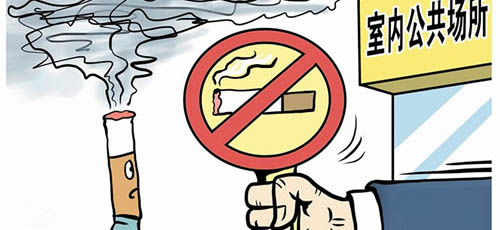Starting June 1st, all indoor public places and many outdoor public places in Beijing are required to be 100-percent smoke-free, including primary and middle schools, seating areas of sports stadiums and hospitals that treat women or children.
從6月1日起,北京市所有的室內(nèi)公共場(chǎng)所和大部分戶外公共場(chǎng)所都必須100%禁煙,包括威脅到婦女和兒童的中小學(xué)、體育場(chǎng)館和醫(yī)院的休息區(qū)。
Violators will face fines of up to 200 yuan ($32), and owners of the establishment will face penalties up to 10,000 yuan.
違者將面臨最高200元(32美元)的罰款,而場(chǎng)所經(jīng)營(yíng)者最高處罰10000元。

"Beijing has now set the bar very high — and we now look forward to other cities around China, and the world, following Beijing’s excellent example," said Bernhard Schwartlander, WHO representative in China.
世界衛(wèi)生組織駐華代表施賀德說:“北京現(xiàn)在已經(jīng)設(shè)置相當(dāng)高的門檻,現(xiàn)在我們期待著中國(guó)和世界的其他城市,能夠?qū)W習(xí)北京的好榜樣。”
The Beijing government is training several thousand inspectors who will be responsible for inspecting venues and issuing fines, and thousands of community volunteers will also be mobilized to support enforcement, according to the WHO China Country Office.
世界衛(wèi)生組織中國(guó)辦事處介紹,北京政府正在培訓(xùn)數(shù)千監(jiān)管員,將負(fù)責(zé)檢查場(chǎng)所巡查和開出罰款,另外還有數(shù)千名社區(qū)志愿者也將被動(dòng)員起來以支持實(shí)施禁煙令。
Zhang Jianshu, president of the Beijing Tobacco Control Association, said it would be difficult to enforce the law in some areas where smoking is prevalent, such as nightclubs.
北京控?zé)焻f(xié)會(huì)會(huì)長(zhǎng)張建樹表示,禁煙令在某些吸煙流行的場(chǎng)所難以執(zhí)行,比如夜總會(huì)等。
"The key lies in business owners," he added. "They have the responsibility to ensure no smoking within their establishments."
“關(guān)鍵在于企業(yè)主,”他補(bǔ)充道:“他們有義務(wù)確保其場(chǎng)所內(nèi)禁止吸煙。”
The deputy director of the Beijing Health Inspection Bureau, said that relying on penalties to curb smoking is not enough.
北京市衛(wèi)生監(jiān)督局副局長(zhǎng)說,依靠懲罰來遏制吸煙是不夠的。
"We hope that more smokers are willing to quit not because of harsh rules, but because of their awareness of the harm caused by smoking," he said.
“我們希望更多的吸煙者并非因?yàn)閲?yán)厲的措施戒煙,而是認(rèn)識(shí)到吸煙對(duì)他們?cè)斐傻奈:Α!彼f。
China has more than 300 million smokers, and more than 1 million people die each year due to smoking-related diseases, according to the National Health and Family Planning Commission.
國(guó)家衛(wèi)生和計(jì)劃生育委員會(huì)的資料顯示,中國(guó)有超過3億煙民,每年有超過100萬人??死于吸煙引起的疾病。
Just ahead of the regulation taking effect, Beijing MTR Corp put up tobacco control posters on all trains on Subway Line 4 as part of the smoke-free campaign by the WHO.
就在禁煙令生效前夕,作為世界衛(wèi)生組織無煙運(yùn)動(dòng)的一部分,北京地鐵公司將控?zé)熜麄骱?bào)張貼在地鐵4號(hào)線上的所有列車。
"I noticed the posters in the subway on my way to work," said he, who has been smoking for more than 10 years. "It might not be easy to quit smoking right away, but I won’t be smoking in nonsmoking areas for sure."
“我在上班乘坐的地鐵上看到了海報(bào),”一個(gè)有10年煙齡的人說:“可能我不太容易馬上戒掉,但絕不會(huì)在無煙區(qū)抽煙了。”
Beijing is home to about 4.2 million smokers, accounting for 23.4 percent of people aged 15 and above. They smoke an average of 14.6 cigarettes per day, according to a survey conducted by the Beijing Center for Disease Control last year.
北京約有420萬煙民,15歲及以上的煙民占23.4%。去年北京疾病預(yù)防中心的一項(xiàng)調(diào)查顯示,他們平均每天吸14.6支煙。












